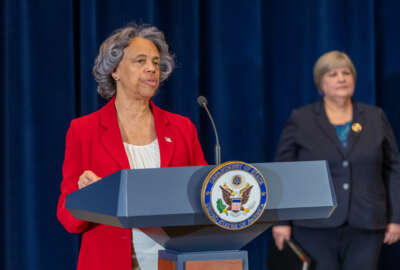Hubbard Radio Washington DC, LLC. All rights reserved. This website is not intended for users located within the European Economic Area.
Exclusive
Survey: Feds question the ‘why’ behind return-to-office push
A Federal News Network survey of 6,300 feds finds leaders’ return-to-office visions aren’t meeting reality for many employees with new in-office requirement...
Editor’s Note: This Federal Report covers initial analysis of Federal News Network’s April 2024 return-to-office survey of federal employees. The story includes results for several of the survey’s questions, but not all of them. We will have more coverage of the survey results in the coming weeks.
It’s been a year since the Biden administration first called for more frequent, “meaningful” in-person work at agencies. In that time, initial uncertainties over whether a return-to-office would really happen have been replaced with a bigger burning question for federal employees: Why?
Why do feds have to wake up earlier, commute to work and sit at a desk all day? Why is the Biden administration trying to fix something that many don’t believe is broken in the first place? And why aren’t federal leaders’ rationales for returning to the office lining up with many feds’ actual experiences?
At first, many employees wondered if the Office of Management and Budget’s April 2023 memo meant they’d have to work in the office more (as it turns out, at many agencies, that is what happened). But now after months of return-to-office plans coming to life, feds’ questions are turning much more to the long term.
Reasons for federal return-to-office unclear to many
In early April, Federal News Network conducted a survey of current federal employees to gauge their perspectives on recent return-to-office changes at their agencies. Within a week, we received 6,338 responses.
Of the survey respondents, about 30% said they work entirely remotely, 6% work entirely in-person and 64% were working on a hybrid schedule — a mix of in-person work and telework.
Over half of employees said senior leadership at their agency had not clearly explained the purpose of returning to the office. More than a third were in strong disagreement.

Alongside return-to-office announcements, many agencies sent messages to their employees, saying they believed increasing in-office work would lead to stronger collaboration, productivity, efficiency, culture, trust and interpersonal connections.
But in practice, whether feds have been working in the office more often for just a couple weeks, a couple months, maybe longer — or even if their return-to-office plans are still undetermined — more than two-thirds of survey respondents agreed that in-office work accomplishes the reverse: It makes them less productive.

Some feds who took the survey pointed to a disconnect between the productive, flexible experiences they’ve described while teleworking, versus what their agency leadership was promoting about the value of in-office work — they said it doesn’t line up.
“We proved how beneficial and productive a modern telework environment can be,” one survey respondent wrote. “Why would I want to go back to the ‘old way’ of doing things that is obviously a relic of the past?”
Expectations vs. reality of in-office work
The April 2023 memo from OMB first outlined the expectations for agencies to increase meaningful in-person work. In other words, OMB said, that means in-office work that’s “purposeful, well-planned and optimized for in-person collaboration.”
“Planning should recognize that some operating units have improved performance while using workplace flexibilities, while also optimizing in-person work and strong, sustainable organization health and culture,” OMB wrote in the 2023 memo.
But many federal employees said OMB’s expectations aren’t aligning with the realities of working in the office.
“Most spend the day in their offices participating in meetings in ‘Zoom’ meetings which they could just as easily do from home,” one survey respondent wrote. “I’m not sure what, if anything, is being gained by those workers coming into the office.”
Many said they felt like coming into the office served little purpose. In the view of some respondents, it was simply a way for agency leaders to fulfill expectations from the administration.
For many respondents, coming into the office has led to little difference in collaboration — and has even been a hindrance for some. Disruptions from coworkers and exhaustion from long commutes contribute negatively to employees’ productivity.

“Working in the office before the pandemic was draining due to commuting [and] prepping for going into the office,” one respondent said. “During the pandemic, employees got the work done and were productive. Requiring in-person work now is arbitrary and driven by factors other than productivity [or] providing good work-life balance.”
Efforts to boost collaboration falling short
Many agencies have implemented what are commonly called “core collaboration days,” in other words aligning employees’ schedules so they’ll be working together in person on the same days. The idea is to foster better collaboration, whether that’s through work-related activities or just getting to know colleagues better on a personal level.
Some respondents agreed that in-person work was in fact better when there were planned meetings or activities for coworkers to collaborate on, and when employees coordinated their days in the office.
But at the same time, many employees said core collaboration days aren’t making as much of an impact as agencies had initially hoped for. Survey responses were overwhelmingly neutral on the effects core collaboration days have on work-related tasks, or interpersonal relationships with coworkers.

Some respondents noted that bonding among coworkers could happen naturally, and didn’t see a need for specific time dedicated to the effort.
Other views on core collaboration days leaned more negative. More than 40% of respondents said these days are adversely affecting staff morale. About half of respondents said core collaboration days actually make them less productive.
“I spend a lot of time chatting and socializing instead of working,” one respondent said. “We spend a lot of time complaining about why we are in the office and how out of touch management is.”
On top of that, some respondents said their agencies’ return-to-office plans aren’t accounting for much collaboration at all.
“We are still staggering days, not everybody is in [at the same time],” one respondent wrote. “The support services aren’t there — no cafes, no gyms. We sit next to each other and log into the same Teams meetings.”
Another respondent wrote, “I went in once for an ‘all-in’ day, and senior management had set up coffee and donuts in one of the conference rooms for everyone. I went in and said hi to the three other people there. We truly had nothing more to talk about, so I left. I didn’t even get coffee or a donut.”
Return-to-office adversely affects views of leadership
Return-to-office announcements and changes are also impacting federal employees’ opinions of senior leadership, and their agencies overall.
While about 49% said changes to in-person work had no effect on their views of agency senior leaders, another roughly 47% said they now feel more negatively about senior leaders after return-to-office announcements. Less than 5% said in-person work made them feel more positively about senior leadership.

It’s also clear that feds place more direct responsibility on senior leaders for return-to-office changes. In the survey, close to three-quarters of feds said return-to-office changes didn’t impact their views of immediate supervisors or managers. Just 22% said the changes had a negative impact on their views of supervisors.
Additionally, in contrast with the language of the OMB memo, many feds believe returning to the office has underlying ulterior motives. A majority of survey respondents said they believe the return-to-office push is either politically motivated, a response to concerns from Congress, an effort to revitalize local economies — or some combination of those factors.

Few respondents said they saw the return-to-office push as an administrative effort to improve customer experience or address collaboration challenges among federal employees.
“There is a consistent swing between heavy encouragement to return to the office and assurance that telework flexibility will remain in place,” one respondent wrote. “The goal posts seem to be consistently moved in terms of management’s expectations, and it has had a resultant and unsurprising reduction in our trust in management to uphold promises or commitments regarding work schedules that take our home-life balance into account.”
Another respondent wrote, “I think the policy needs to be more flexible, meaning that it actually gives individuals a say in the matter. If someone wishes to work in-person, then allow them to report to the office. However, if someone’s work can be done completely remote and the person wishes to work remotely, then allow the individual to do so, especially if there is no issue with the person’s productivity.”
Nearly Useless Factoid
71% of remote workers said remote work helps balance their work and personal life.
Source: Forbes
This story includes results for several of Federal News Network’s survey questions, but not all of them. Please stay tuned for more coverage of the survey results in the coming weeks.
Copyright © 2024 Federal News Network. All rights reserved. This website is not intended for users located within the European Economic Area.
Drew Friedman
Drew Friedman is a workforce, pay and benefits reporter for Federal News Network.
Follow @dfriedmanWFED





